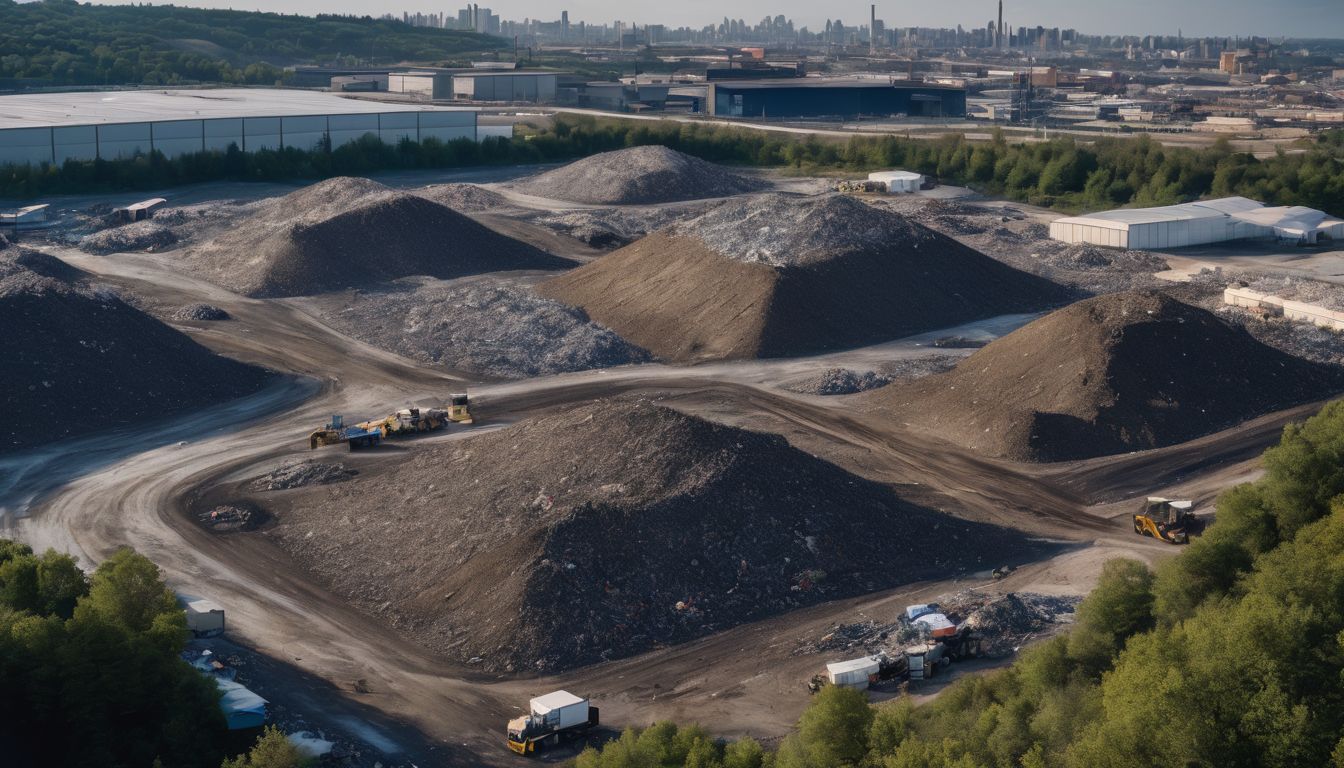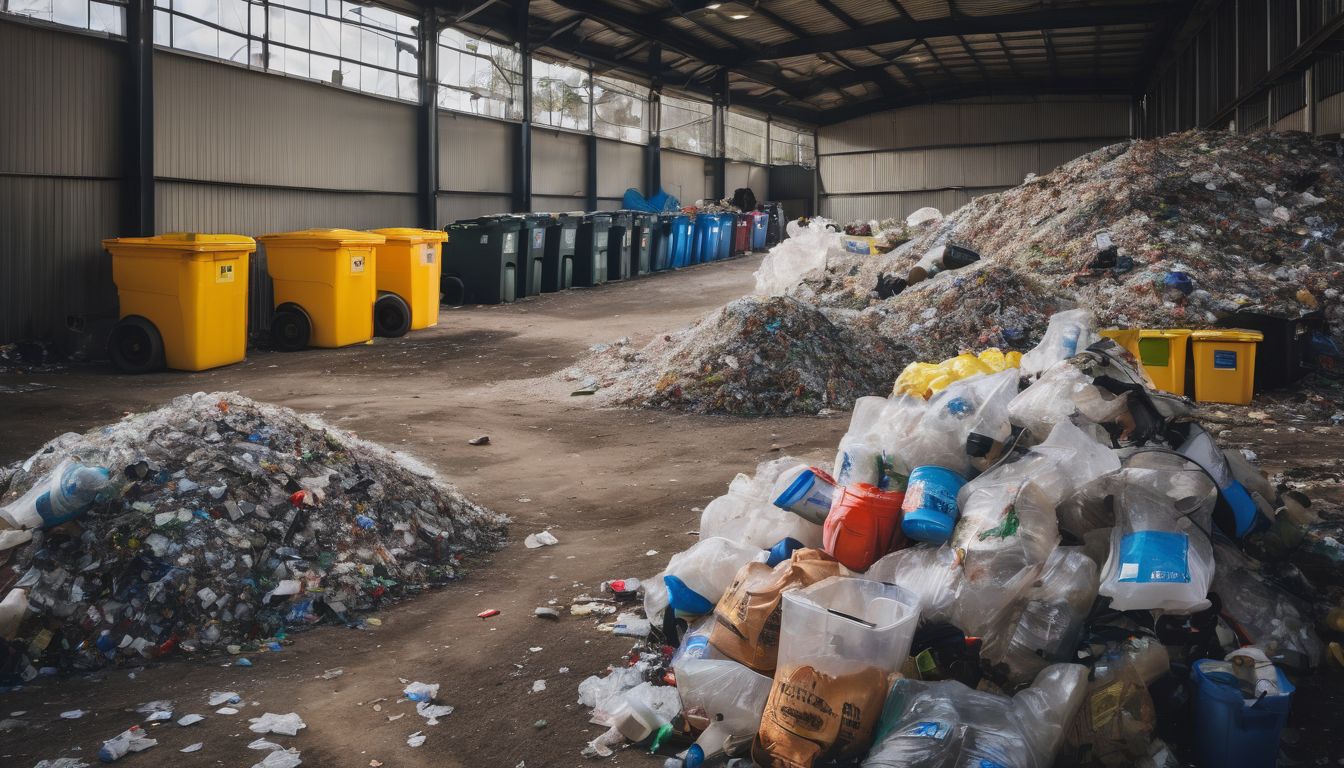As cities grow, so does the challenge of managing our waste. In bustling urban centres, each person produces about half a tonne of waste every year. Our blog offers clever ways to turn this problem into a sustainable solution by embracing recycling.
Dive in and discover how easy being green can be!
Key Takeaways
- Recycling in urban areas reduces environmental contamination by keeping waste out of landfills and lessening pollution caused by manufacturing from virgin materials.
- Urban recycling has cost benefits, saving cities money on landfill space and energy, while promoting cleanliness through less street litter and lower risks of pests and diseases.
- By encouraging recycling practices, communities come together for a common purpose, boosting the local economy with new jobs in recycling industries and creating fundraising opportunities for environmental projects.
- Effective plastic waste recycling is vital to reducing plastic pollution that harms ecosystems; it also supports sustainable living by cutting down on the production of new plastics.
- To recycle effectively in cities, residents should separate recyclables, participate in educational campaigns about the benefits of recycling, use local facilities correctly, reduce single-use items, compost organic waste when possible, and encourage businesses to adopt eco-friendly practices.
Why Urban Areas Need Increased Access to Recycling
Urban areas need increased access to recycling because it offers environmental benefits, cost savings, and promotes cleanliness in densely populated areas. Proper waste management is crucial for the well-being of urban spaces.
Environmental benefits of recycling
Recycling transforms what we discard into valuable resources, curbing the need to exploit virgin materials. It significantly reduces environmental contamination by diverting waste from landfills and decreasing pollution from production processes.
Manufacturing products from recycled materials consumes less energy and water, further conserving our planet’s limited resources.
As urban populations grow, effective solid waste management becomes even more crucial. Recycling helps sustain a circular economy where goods are reused rather than disposed of, slashing the volume of industrial waste that often ends up in city outskirts.
This shift towards greener living supports sustainable urban space development and fosters global environmental conservation efforts.
Cost benefits
Recycling in urban areas provides significant cost benefits. By diverting waste from landfills, cities can reduce the expenses associated with waste management and landfill maintenance.
The reuse of materials also decreases the need for raw resource extraction and manufacturing, leading to savings in energy and production costs. These financial advantages can positively impact local economies and contribute to sustainable urban development.
Moving on to “Promotes Cleanliness,” effective recycling programs play a vital role in maintaining a clean urban environment while reducing pollution and promoting eco-friendly practices.
Promotes cleanliness
Recycling promotes cleanliness in urban areas by reducing the amount of waste sent to landfills. By recycling materials like plastic, paper, and glass, less rubbish accumulates in the streets and public spaces.
This not only makes cities cleaner but also reduces the risk of pests and disease associated with unmanaged waste.
Fostering a culture of recycling encourages individuals to dispose of their waste responsibly, thereby contributing to a cleaner environment for everyone. Additionally, it minimises the need for costly clean-up efforts and helps maintain a more visually appealing urban landscape that residents can take pride in.
The Impact of Recycling on Urban Space
Recycling in urban areas plays a crucial role in reducing environmental contamination and protecting limited resources. However, challenges with waste management continue to impact the urban space, making it essential for increased access to recycling facilities and community involvement.
Reducing environmental contamination
Recycling reduces environmental contamination by diverting waste from landfills and incinerators. This prevents harmful substances from seeping into the soil and water, safeguarding ecosystems.
By reusing materials like paper, plastic, glass, and metal, we can significantly reduce pollution levels in urban areas. Creating a sustainable recycling infrastructure is essential for protecting our environment from further degradation caused by irresponsible waste disposal.
Protecting limited resources involves proper recycling methods that conserve raw materials and energy. Recycling aluminium cans, for instance, uses 95% less energy than producing new ones.
Protecting limited resources
Recycling protects our limited resources, ensuring that we can sustainably manage our raw materials. By reusing and repurposing items, we reduce the need for extracting new resources from nature.
This not only conserves valuable natural reserves but also minimises the environmental impact of resource extraction.
Promoting recycling in urban areas is crucial for safeguarding our finite resources. It enables us to extend the lifespan of materials such as metals, plastics, and paper, reducing the strain on our environment and helping to create a more sustainable future for generations to come.
Challenges with waste management
Waste management in urban areas presents several challenges that require immediate attention. Limited space and increasing waste generation strain available landfills, leading to potential environmental contamination.
Industrial waste poses a significant threat to local ecosystems and water sources. Furthermore, managing diverse types of waste demands innovative solutions to reduce pollution and preserve limited resources while promoting green living.
To address these challenges effectively, community engagement in recycling initiatives is crucial. Involving residents and businesses in sustainable practices will not only minimise the burden on landfills but also support economic growth by creating opportunities for local recycling industries.
Economic and Social Benefits of Recycling in Cities
Recycling in cities can boost the local economy, bring communities together, and provide fundraising opportunities. Read on to learn more about the positive impact of recycling in urban areas.
Boosts local economy
Recycling in urban areas boosts the local economy by creating jobs and generating revenue. It encourages the growth of recycling-related industries, such as collection, processing, and manufacturing.
This provides employment opportunities for locals and contributes to economic development within the community. Moreover, it reduces waste management costs for municipalities, freeing up resources that can be allocated to other essential services like infrastructure improvement or public facilities.
By recycling locally, communities can benefit economically from reduced landfill costs and increased revenues from selling recyclable materials. Additionally, recycling helps in conserving energy and natural resources which further supports a sustainable local economy.
Brings communities together
Recycling not only boosts the local economy but also brings communities together. It creates opportunities for people to come together and work towards a common goal, fostering a sense of unity and pride in their neighbourhoods.
Community recycling drives enable residents to collaborate, share resources, and build relationships while contributing to a cleaner and healthier environment.
Furthermore, by participating in fundraising opportunities through recycling initiatives, communities can bond over their shared commitment to sustainable practices. This collective effort not only strengthens community ties but also promotes awareness and education about the importance of environmental conservation, shaping a more eco-conscious society for future generations.
Fundraising opportunities
Communities in urban areas can take advantage of fundraising opportunities through recycling initiatives. By organising recycling drives or partnering with local businesses, schools, and community organisations, environmentally conscious individuals can raise funds to support conservation and environmental efforts.
Additionally, hosting awareness events or eco-friendly workshops not only promotes the importance of recycling but also provides an opportunity to generate funds for sustainability projects and waste management programmes in urban areas.
Supporting sustainable practices by participating in fundraising activities helps strengthen communities and creates a tangible impact on the environment. It fosters collaboration among residents, businesses, and local authorities while raising crucial financial resources for recycling infrastructure, waste reduction campaigns, and other eco-friendly initiatives that benefit urban spaces.
Recycling as a Solution to the Plastic Waste Problem
Recycling plays a crucial role in reducing plastic pollution and promoting sustainable practices in urban areas. By effectively recycling plastic waste, cities can work towards creating a cleaner and healthier environment for all its residents.
Reduces plastic pollution
Recycling reduces plastic pollution by preventing plastics from ending up in landfills or being improperly disposed of, which can contaminate soil and waterways. By recycling plastic materials, we reduce the demand for new plastics to be produced, lowering the amount of plastic waste that litters our urban areas.
This practice also helps prevent harmful chemicals from leaching into the environment from decomposing plastics, safeguarding the health of ecosystems and wildlife.
Promoting sustainable practices through recycling encourages individuals and communities to adopt environmentally friendly habits, helping to diminish the detrimental impact of plastic pollution on our planet.
Promotes sustainable practices
By recycling in urban areas, eco-friendly practices can be promoted. The reduction of waste through recycling helps to conserve natural resources and reduce pollution. Individuals who choose to recycle effectively contribute to sustainable living and support environmental conservation.
Embracing sustainable practices is essential for managing urban waste and protecting the environment for future generations.
Moving on to “How to recycle effectively,” let’s explore practical ways individuals can make a positive impact on their communities through responsible recycling habits.
How to recycle effectively
- Separate recyclables: Ensure that paper, plastics, glass, and metal are separated before disposal.
- Educate the community: Raise awareness about the importance of recycling through workshops and informational campaigns.
- Utilise recycling facilities: Support local recycling centres and drop-off points to dispose of recyclable materials properly.
- Reduce single-use items: Encourage the use of reusable products to minimise waste generation.
- Compost organic waste: Establish composting programmes to reduce the amount of organic waste sent to landfills.
- Partner with businesses: Collaborate with local businesses to implement sustainable packaging and waste reduction measures.
Conclusion
Recycling plays a crucial role in fostering sustainable urban development. It creates a cleaner environment and conserves natural resources, ensuring a healthier and more prosperous future for urban communities.
With increased access to recycling, cities can effectively tackle waste management challenges, promote eco-friendly practices, and boost their local economies. Recycling is not just an option; it’s an essential part of building thriving, livable cities for generations to come.
FAQs
1. Why is recycling important in urban areas?
Recycling in urban areas is crucial because it helps manage the large amount of waste, reduces pollution, and cuts down on landfill challenges.
2. What are the benefits of recycling for cities?
Cities benefit from recycling through pollution reduction, less strain on landfills, and economic gains from turning waste into reusable materials.
3. Can recycling impact the economy of urban regions?
Yes, there are significant economic benefits to urban areas that recycle by creating jobs in industrial waste management and promoting eco-friendly practices.
4. How does managing waste help our environment?
Urban waste management through recycling conserves resources, minimises industrial pollutants, and supports sustainable city living by keeping harmful materials out of the environment.





